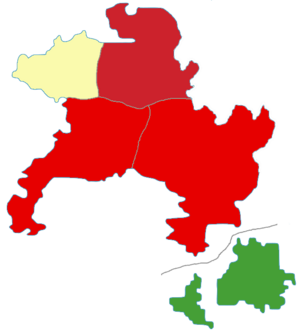Akashian general election, 1974
| |||||||||||||||||||||||||||||||||||||||||||||||||||||||||||||||||||||||||||||||||||||
200 seats in the National Assembly 101 seats needed for a majority | |||||||||||||||||||||||||||||||||||||||||||||||||||||||||||||||||||||||||||||||||||||
|---|---|---|---|---|---|---|---|---|---|---|---|---|---|---|---|---|---|---|---|---|---|---|---|---|---|---|---|---|---|---|---|---|---|---|---|---|---|---|---|---|---|---|---|---|---|---|---|---|---|---|---|---|---|---|---|---|---|---|---|---|---|---|---|---|---|---|---|---|---|---|---|---|---|---|---|---|---|---|---|---|---|---|---|---|---|
| Turnout | 88,6% | ||||||||||||||||||||||||||||||||||||||||||||||||||||||||||||||||||||||||||||||||||||
| |||||||||||||||||||||||||||||||||||||||||||||||||||||||||||||||||||||||||||||||||||||
 Most voted party by province | |||||||||||||||||||||||||||||||||||||||||||||||||||||||||||||||||||||||||||||||||||||
| |||||||||||||||||||||||||||||||||||||||||||||||||||||||||||||||||||||||||||||||||||||
A general election was held in Akashi on 29 June 1974. The incumbent Kasumi Kuroki government was re-elected with a majority.
Tarō Yukimura was persuaded to resign a month before the election in favour of Kasumi Kuroki, as senior Socialist Party figures worried his sinking popularity would cause a defeat. Kasuko was one of the cabinet's most popular ministers, and seen as the party's best bet to win re-election.
The SP ran a campaign that emphasised its radical policies during the "siege economy", touting its success at maintaining full employment and expanding the welfare state. It also played up Kasuko's personality heavily, using the slogan "Let Kasuko Lead On" (Miranian: かすこに先導させて Kasuko ni sendō sa sete). Meanwhile, the Communist Party called on voters to support the party so that it had greater leverage to push the government to the left.
The right-wing opposition attacked the government's "mismanagement" of the economy, highlighting industrial unrest. However, the solution to this issue remained a wedge between the light blue and dark blue blocs.
Results
| General election, 29 June 1974 | |||||||||
|---|---|---|---|---|---|---|---|---|---|

| |||||||||
| Party | Party list | Constituency | Total seats |
+/- | |||||
| PR | % | +/− | STV | % | +/− | ||||
| Socialist Party | 1.053.552 | 20,4% | -2,1% | 1.492.626 | 29,0% | +1,3% | 45 | +5 | |
| National Cooperative Party | 619.737 | 12,0% | +0,2% | 540.434 | 10,5% | +0,5% | 27 | +2 | |
| Communist Party | 588.750 | 11,4% | +1,0% | 823.518 | 16,0% | +0,2% | 28 | +2 | |
| Liberal Party | 387.335 | 7,5% | -1,2% | 370.583 | 7,2% | -1,2% | 23 | -1 | |
| Agrarian Party | 371.842 | 7,2% | -0,1% | 411.759 | 8,0% | -0,5% | 20 | -2 | |
| National Union | 361.513 | 7,0% | ±0,0% | 380.877 | 7,4% | -1,6% | 15 | -2 | |
| National Democratic Party | 351.184 | 6,8% | +0,3% | 159.557 | 3,1% | -0,2% | 10 | -1 | |
| Reform Party | 304.704 | 5,9% | -0,3% | 149.263 | 2,9% | -0,3% | 8 | -2 | |
| United Akashi | 284.046 | 5,5% | -0,3% | 138.969 | 2,7% | -0,4% | 7 | -3 | |
| Social Credit Party | 258.224 | 5,0% | +1,0% | 77.205 | 1,5% | -0,2% | 5 | +1 | |
| Conservative National Party | 180.757 | 3,5% | ±0,0% | 128.675 | 2,5% | +0,3% | 4 | +1 | |
| Akashi Renewal Party | 144.605 | 2,8% | +0,7% | 61.764 | 1,2% | +0,1% | 3 | +1 | |
| Freedom League | 92.961 | 1,8% | -0,4% | 51.470 | 1,0% | ±0,0% | 2 | ±0 | |
| Tax Cuts Party | 77.467 | 1,5% | +1,5% | 231.614 | 4,5% | +4,5% | 1 | +1 | |
| Independents | 87.796 | 1,7% | -0,3% | 128.675 | 2,5% | -2,5% | 4 | -2 | |
| Total | 5.164.473 | 100% | — | 5.146.986 | 100% | — | 200 | — | |
| Registered voters and turnout | 5.828.976 | 88,6% | — | 5.828.976 | 88,3% | ||||
| Bloc strength | ||
|---|---|---|
| Bloc | Parties | Seats |
| Crimson bloc | CP, SCP | 33 |
| Pale crimson bloc | SP, NU | 60 |
| Light yellow bloc | NCP, AP | 45 |
| Light blue bloc | LP, NDP, RP, UA | 48 |
| Dark blue bloc | CNP, ARP, FL, TCP | 10 |
- Government: Socialist Party–National Cooperative Party–National Union–Agrarian Party coalition.
The coalition was re-elected easily. Kasuko successfully increased the SP's seat tally by 5 seats, which made up for the minor losses of the AP and NU. The crimson and pale crimson blocs collectively increased their seats by 6, while the light yellow bloc remained steady.
The light blue bloc suffered a setback, with the distance between it and the pale crimson bloc increasing to 10 seats.
Kasuko would remain in office until 1977, when she resigned in a successful ploy to pass the black budget. Naoko Nemoto would take over as interim Prime Minister until the SP chose a new leader, who was Yumiko Nagatsuki.



